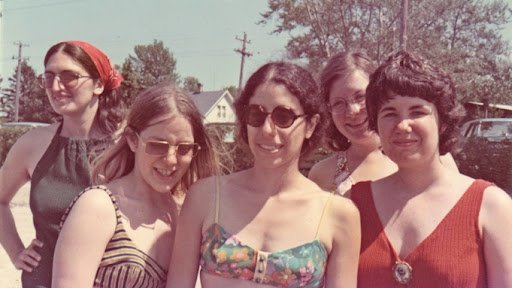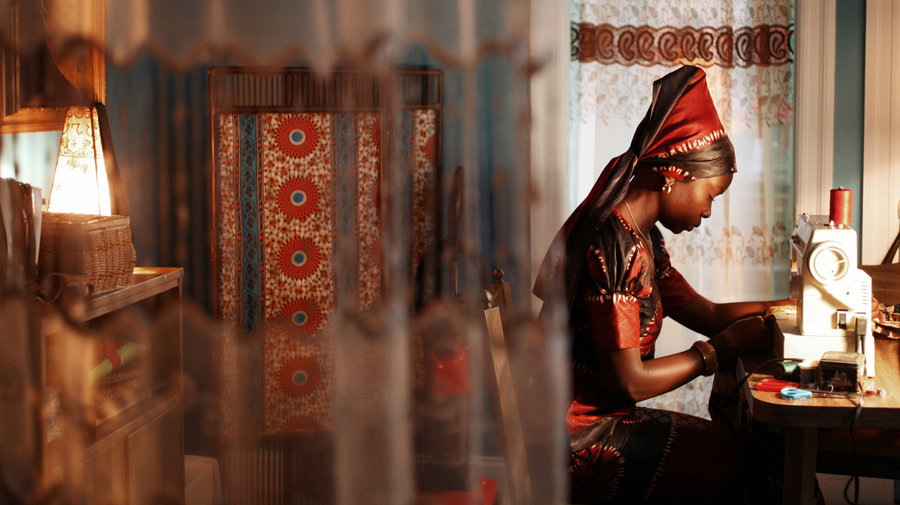BFF FILM & FESTIVAL BLOG
What We Loved About Sundance
Written by Katerina Plescia
Still from The Janes courtesy of Sundance Institute
After their first virtual viewing experience, the 45th annual Sundance Film Festival commenced on January 20, 2022, in a hybrid form. Over the eleven-day celebration, artists presented their films through various online programs.
With the looming pressures of the Omicron variant and the ongoing COVID-19 pandemic, the Sundance artists persevered to uphold the importance of gathering as a community. Regardless of the circumstances, the Sundance Film Festival reminded audiences that in these tough times, viewers should continue to come together and celebrate what the artists have to offer.
The Festival brought out a conglomeration of fantastic and culturally significant films. Each submission offered a glance into a variety of social and cultural lifestyles.
Filmmakers Tia Lessen and Emma Pildes premiered their documentary, The Janes, at the festival, enthralling audiences with a story of women who organized nearly 11,000 affordable illegal abortions in Chicago, IL prior to the passage of Roe v. Wade. While the documentary was impressive and educational for those unfamiliar with the situation, the film did not add anything new to the conversation. The revolution was primarily set in the late 1960s, however, bringing the story into the modern era would have granted it the potential missing element.
The film Midwives centered around the relationship between Muslims and Buddhists in Myanmar. Setting aside military differences, a Buddhist woman, Hla, and Nyo Nyo, a Muslim woman, worked together to treat Muslim patients. Sundance newcomer Snow Hnin Ei Hlaing’s feature debut was incredibly insightful, providing audiences with a close-up glance into the relations between Muslim Rohingya of Myanmar and Buddhists of Myanmar.
Still from Midwives courtesy of Sundance Institute
Reid Davenport’s experimental documentary, I Didn’t See You There, approached the viewpoint of a wheelchair user from a new perspective. Although Davenport is never seen on the big screen, the film consists of hand-held point-of-view shots, placing audience members in the shoes of a wheelchair user in America.
The 2022 celebration of the Sundance Film Festival lifted the spirits of community members and continued to spread their message of support to independent artists. The festival was packed with a total of 85 features, 59 short films, and much more. Filled with enlightening interviews, thoughtful conversations, and groundbreaking films, the Sundance Film Festival of 2022 has us on the edge of our seats waiting for next year.
Katerina is a junior at Pace University in Pleasantville, NY. After graduation, she aspires to work as an entertainment journalist, centering her writing around music, film, and the arts. She grew up in Bethel, NY and is a dog mom to a Pitbull rescue, Maddie. Find more of her work on her website or Instagram.
Sad Love Stories That Leave You Wanting More
Written by Diomarys Mendez
The theme of unrequited or unfulfilled love is one that has been uniquely retold time and time again. Stories of longing, lingering passion, and hope for an intangible love can evoke empathy, nostalgia, and melancholy.
Today, I will be recommending three foreign films with very different meditations on love, but that will all leave you wanting more.
In The Mood for Love (pictured above)
In the Mood for Love was directed by Wong Kar Wai in 2001. It is set in 1960s Hong Kong and follows two characters, Su Li-zhen (Maggie Cheung) and Chow Mo-wan (Tony Leung), who develop a tragic love story through their unfulfilled marriages.
The story is a powerful reflection on oppressed love and is both a technical achievement and a poetic musing on human longing. This atmospheric film effectively portrays quiet and intense desire by playing with time through repetition/slow-motion, framing, body language, and dialogue. Thus, the audience feels the gradual heightening of emotions boiling under the surface of these two characters’ interactions, but that ultimately leaves no trace.
Shoplifters
2018 Palme d'Or-winning film Shoplifters is a unique tale that explores the meaning of family. It raises the idea that one does not have to be limited to bloodlines, but can instead choose what family to belong to. Along with the overarching theme of what constitutes a family, the film also poses many important questions about poverty, government and societal neglect, and social norms.
The film begins with an impoverished family that essentially kidnaps a young girl and introduces her to their way of surviving. Although at times questionable, the actions taken by each member of the Shibata household stem from love.
This story is tender and complex, and director Hirokazu Kore-eda skillfully peels away the layers, revealing secrets about the family in a slow yet fluid pace. This film felt very authentic because it allowed the audience to observe the dynamic of this family in an environment free of judgment. In addition, the performances in Shoplifters were exquisite, and the cinematic language, although complicated, visually translated the narrative to the screen beautifully and seamlessly.
Kore-eda masterfully tells a story about compassion and love, challenging audiences to rethink the definition of family. Shoplifters is an honest yet tragic account about the lives of these complex characters, who briefly come together to embark on a journey where they discover the meaning of familial love.
Us and Them
“Happiness is not a story. Misfortune is,” Qing Jian muses in Us and Them. This cynical statement from the film encapsulates the tone and overall driving force of this story.
Rene Liu’s directorial debut tells the story of two characters, Qing Jian (Boran Jing) and Xiao Xiao (Dongyu Zhou), and their decade-long relationship, along with all the natural unfolding and undoing that happens during that time. Us and Them has many themes, but it mainly examines the contrast between the effects of personal change on an individual versus their relationships. The film shows how, at times, the steps necessary to grow can ironically result from mistakes made and connections lost.
The underlying tragedy of this story lies in the characters’ inability to communicate and express their love for one another, which eventually leads to them parting ways. Through flashbacks and moments of silence, we see how these two characters reflect on and cope with love lost, and the unbearable truth of not being able to turn back time to change the outcome. This nostalgic film reminisces on the sweet and sour seasons of love and essentially asks, If you had the chance to see a past lover one more time, what would you do and say?
Although very different, each of these three films interprets the many flavors that love has to offer and leaves audiences weeping and profoundly moved.
Are you ready to bring out the tissues and embark on these journeys?
Diomarys Mendez is a film lover and has dedicated her life to creating and providing more diverse narratives in the film and music scene. Diomarys has a background in Business, Music, and Theater and lives in New York City.
FILM REVIEW: MOTHER OF GEORGE
Mother Of George, written by Darci Picoult and directed by Andrew Dosunmu, is a film as much about secrets and truth (or the distortion of them) as it is about the complicated and oftentimes public display of a woman’s childbearing challenges in many African cultures. Set in a tightly knit immigrant community in Brooklyn, NY, the film poses many unbearable questions — foremost, how far would someone go to hide the truth of things? The answer, shockingly far. Before we get further into the films’ review, I can’t help but share how I met its writer, Darci Picoult, at the Bushwick Film Festival’s “Women in Film” Panel in October.
When I nervously called Cori Thomas ( Screenwriter and Co-founder of Pa’s Hat Foundation) to ask her if she would be willing to be on the Bushwick Film Festival’s “Women in Film” Panel this year, I was extremely thrilled when she not only agreed, but also offered to call Darci Picoult, writer of Mother Of George, to be on the panel. And Darci Picoult said yes! Now, with Cori and Darci on board, the program was officially locked and their addition made the entire festival rock solid.
Cori strongly suggested that I go and see Mother Of George before the panel. However, the film hit theaters when the festival was just weeks away. But after meeting Darci and admiring her extremely insightful answers to the eager female filmmakers in the audience and hearing about the film’s journey, I ran to Quad Cinemas in Union Square just days after we closed.
As I lingered in my seat after the final credits had scrolled out of sight and the lights came up, I wondered if I had experienced the film differently because of two things. First, I had heard from the writer herself about the details of the film’s fifteen year journey to the screen. I had witnessed first hand how much she loved her own daughter (Darci’s final panel question asked her who her biggest inspiration was, and her response was her daughter, who sat bashfully in the front row). Would I have felt such a strong sense of appreciation without knowing the thousands of things that came together to make the film nearly perfect? And second, if I, myself, had not been from West Africa, Liberia, would the film have hit so close to home emotionally?
The film opens at the traditional Nigerian wedding of Adenike (Danai Gurira) and Ayodele (Isaach de Bankole). From the moment the first image hit the screen, I felt overwhelmed with how beautifully cinematographer Bradford Young (Middle Of Nowhere) depicted African culture, rich in all its tradition, color, grandeur, and African people (close camera shots of faces and bodies). The camera movement was breathtaking and the wedding scene beautiful. But it wasn’t too long after the blessings and advice were bestowed on the bride and groom with a final wish by the groom’s mother for a grandson named George, that the other face of tradition and culture reared its ugly head.
So the answer is yes. Yes, I may have had a different experience because of the two circumstances mentioned, but as it stands Mother Of George is a remarkable example of what can happen when a storyteller/playwright like Darci who has fine-tuned her craft teams up with a director like Andrew Dosunmu, who knows his subjects so intimately.
I highly suggest seeing the film in theaters, but sorry New York, it’s no longer on our big screens. But for our friends in Milwaukee and Tallahasse it is! Mother of George will continue to make its way across the U.S. between now and February. Click here to see a complete list of showtimes.
Director: Andrew Dosunmu
Writer: Darci Picoult
Stars: Isaach De Bankolé, Danai Gurira, Yaya Alafia, See full cast and crew










